UNIT 2 WATER SPORTS教案
Unit-2-Water-sports教案
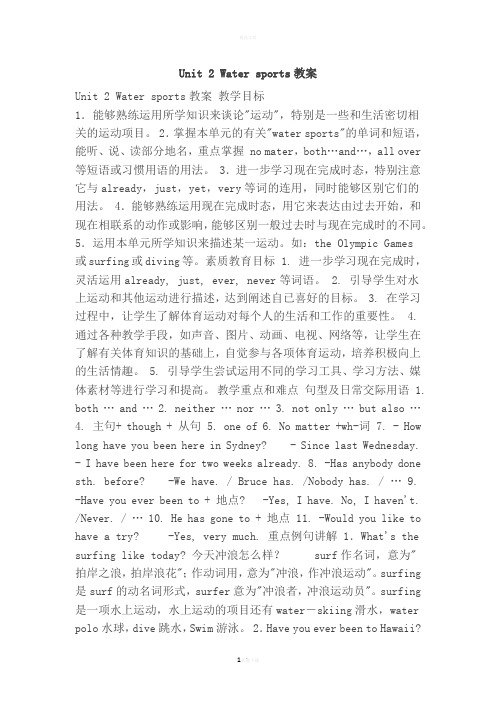
Unit 2 Water sports教案Unit 2 Water sports教案教学目标1.能够熟练运用所学知识来谈论"运动",特别是一些和生活密切相关的运动项目。
2.掌握本单元的有关"water sports"的单词和短语,能听、说、读部分地名,重点掌握 no mater,both…and…,all over 等短语或习惯用语的用法。
3.进一步学习现在完成时态,特别注意它与already,just,yet,very等词的连用,同时能够区别它们的用法。
4.能够熟练运用现在完成时态,用它来表达由过去开始,和现在相联系的动作或影响,能够区别一般过去时与现在完成时的不同。
5.运用本单元所学知识来描述某一运动。
如:the Olympic Games或surfing或diving等。
素质教育目标 1. 进一步学习现在完成时,灵活运用already, just, ever, never等词语。
2. 引导学生对水上运动和其他运动进行描述,达到阐述自已喜好的目标。
3. 在学习过程中,让学生了解体育运动对每个人的生活和工作的重要性。
4. 通过各种教学手段,如声音、图片、动画、电视、网络等,让学生在了解有关体育知识的基础上,自觉参与各项体育运动,培养积极向上的生活情趣。
5. 引导学生尝试运用不同的学习工具、学习方法、媒体素材等进行学习和提高。
教学重点和难点句型及日常交际用语 1. both … and … 2. neither … nor … 3. not only … but also …4. 主句+ though + 从句5. one of6. No matter +wh-词7. - How long have you been here in Sydney? - Since last Wednesday. - I have been here for two weeks already.8. -Has anybody done sth. before? -We have. / Bruce has. /Nobody has. / …9. -Have you ever been to + 地点? -Yes, I have. No, I haven't. /Never. / … 10. He has gone to + 地点 11. -Would you like to have a try? -Yes, very much. 重点例句讲解 1.What's the surfing like today? 今天冲浪怎么样?surf作名词,意为"拍岸之浪,拍岸浪花";作动词用,意为"冲浪,作冲浪运动"。
Unit2Water微课程设计方案

Unit 2 Water微课程设计方案
设计亮点:
(请你从教学方法、案例选取、媒体选择、互动设计、技术细节等方面来说明你的设计亮点,以便其他教师更好地关注微课程的设计细节,不超过300字。
)
本节课采用多媒体教学法、任务型教学法、互动式教学法等。
所谓任务型英语教学(Task-based English Teaching),就是在英语课堂教学中让学生用英语完成各种真实的生活、学习、工作等任务,其运用英语的能力,教学中要以具体的任务为载体,以完成任务为动力,把知识和技能融为一体。
它是20世纪80年代在语言习得理论和交际教学思想的研究和实践基础上发展起来的有重要影响的语言教学理论。
Unit 2 Water sports Lesson 5
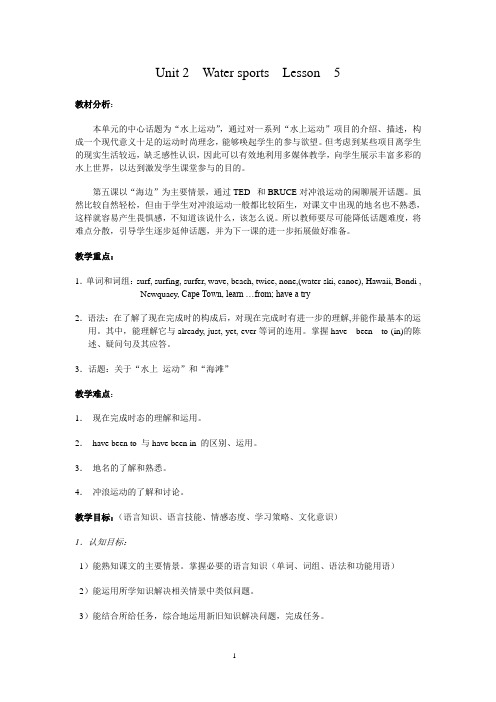
Unit 2 Water sports Lesson 5教材分析:本单元的中心话题为“水上运动”,通过对一系列“水上运动”项目的介绍、描述,构成一个现代意义十足的运动时尚理念,能够唤起学生的参与欲望。
但考虑到某些项目离学生的现实生活较远,缺乏感性认识,因此可以有效地利用多媒体教学,向学生展示丰富多彩的水上世界,以达到激发学生课堂参与的目的。
第五课以“海边”为主要情景,通过TED 和BRUCE对冲浪运动的闲聊展开话题。
虽然比较自然轻松,但由于学生对冲浪运动一般都比较陌生,对课文中出现的地名也不熟悉,这样就容易产生畏惧感,不知道该说什么,该怎么说。
所以教师要尽可能降低话题难度,将难点分散,引导学生逐步延伸话题,并为下一课的进一步拓展做好准备。
教学重点:1.单词和词组:surf, surfing, surfer, wave, beach, twice, none,(water-ski, canoe), Hawaii, Bondi , Newquacy, Cape Town, learn …from; have a try2.语法:在了解了现在完成时的构成后,对现在完成时有进一步的理解,并能作最基本的运用。
其中,能理解它与already, just, yet, ever等词的连用。
掌握have been to (in)的陈述、疑问句及其应答。
3.话题:关于“水上运动”和“海滩”教学难点:1.现在完成时态的理解和运用。
2.have been to 与have been in 的区别、运用。
3.地名的了解和熟悉。
4.冲浪运动的了解和讨论。
教学目标:(语言知识、语言技能、情感态度、学习策略、文化意识)1.认知目标:1)能熟知课文的主要情景。
掌握必要的语言知识(单词、词组、语法和功能用语)2)能运用所学知识解决相关情景中类似问题。
3)能结合所给任务,综合地运用新旧知识解决问题,完成任务。
4)能根据本人能力,有个性地解决问题,提出独特的见解。
【知识学习】Unit 2 Water sports教案

Unit 2 Water sports教案Unit2watersports教案教学目标1.能够熟练运用所学知识来谈论"运动",特别是一些和生活密切相关的运动项目。
2.掌握本单元的有关"watersports"的单词和短语,能听、说、读部分地名,重点掌握nomater,both…and…,allover等短语或习惯用语的用法。
3.进一步学习现在完成时态,特别注意它与already,just,yet,very等词的连用,同时能够区别它们的用法。
4.能够熟练运用现在完成时态,用它来表达由过去开始,和现在相联系的动作或影响,能够区别一般过去时与现在完成时的不同。
5.运用本单元所学知识来描述某一运动。
如:theolympicGames或surfing或diving等。
素质教育目标.进一步学习现在完成时,灵活运用already,just,ever,never等词语。
2.引导学生对水上运动和其他运动进行描述,达到阐述自已喜好的目标。
3.在学习过程中,让学生了解体育运动对每个人的生活和工作的重要性。
4.通过各种教学手段,如声音、图片、动画、电视、网络等,让学生在了解有关体育知识的基础上,自觉参与各项体育运动,培养积极向上的生活情趣。
5.引导学生尝试运用不同的学习工具、学习方法、媒体素材等进行学习和提高。
教学重点和难点句型及日常交际用语.both…and…2.neither…nor…3.notonly…butalso…4.主句+though+从句5.oneof6.Nomatter+wh-词7.-HowlonghaveyoubeenhereinSydney?-Sincelastwednesday.-Ihavebeenherefortwoweeksalready.8.-Hasanybodydonesth.before?-wehave./Brucehas./Nobodyhas./…9.-Haveyoueverbeento+地点?-yes,Ihave.No,Ihaven't./Never./…0.Hehasgoneto+地点1.-wouldyouliketohaveatry?-yes,verymuch.重点例句讲解.what'sthesurfingliketoday?今天冲浪怎么样?surf作名词,意为"拍岸之浪,拍岸浪花";作动词用,意为"冲浪,作冲浪运动"。
【九年级】Unit 2 Water sports教案
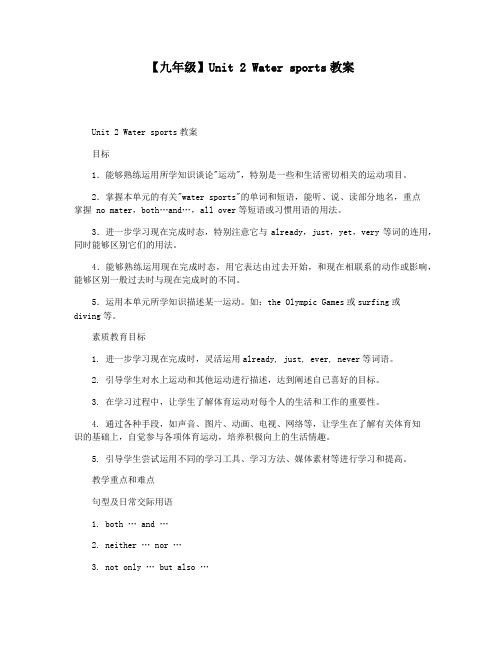
【九年级】Unit 2 Water sports教案Unit 2 Water sports教案目标1.能够熟练运用所学知识谈论"运动",特别是一些和生活密切相关的运动项目。
2.掌握本单元的有关"water sports"的单词和短语,能听、说、读部分地名,重点掌握 no mater,both…and…,all over等短语或习惯用语的用法。
3.进一步学习现在完成时态,特别注意它与already,just,yet,very等词的连用,同时能够区别它们的用法。
4.能够熟练运用现在完成时态,用它表达由过去开始,和现在相联系的动作或影响,能够区别一般过去时与现在完成时的不同。
5.运用本单元所学知识描述某一运动。
如:the Olympic Games或surfing或diving等。
素质教育目标1. 进一步学习现在完成时,灵活运用already, just, ever, never等词语。
2. 引导学生对水上运动和其他运动进行描述,达到阐述自已喜好的目标。
3. 在学习过程中,让学生了解体育运动对每个人的生活和工作的重要性。
4. 通过各种手段,如声音、图片、动画、电视、网络等,让学生在了解有关体育知识的基础上,自觉参与各项体育运动,培养积极向上的生活情趣。
5. 引导学生尝试运用不同的学习工具、学习方法、媒体素材等进行学习和提高。
教学重点和难点句型及日常交际用语1. both … and …2. neither … nor …3. not only … but also …4. 主句+ though + 从句5. one of6. No matter +wh-词7. - How long have you been here in Sydney?- Since last Wednesday.- I have been here for two weeks already.8. -Has anybody done sth. before?-We have. / Bruce has. /Nobody has. / …9. -Have you ever been to + 地点?-Yes, I have. No, I haven't. /Never. / …10. He has gone to + 地点11. -Would you like to have a try?-Yes, very much.重点例句讲解1.What's the surfing like today? 今天冲浪怎么样?surf作名词,意为"拍岸之浪,拍岸浪花";作动词用,意为"冲浪,作冲浪运动"。
【牛津版】八年级英语下册 Unit 2 Water教案

Unit 2 Water教学目标Language objectives:Make the students understand the main idea of the passage.Teach the students how water goes into our flats.Ability objectives:Students learn to retell the water’s journey according to some key words. Students can learn some reading skills.Emotional objectives:Let the students know it is not easy for water to get to our flats and make them realize the value of water. Ask the students to save water.2重点难点1.to master the reading method2.to know about the circulation of water and try to express it3教学过程3.13.1.1教学活动活动1【导入】warming-up1) Do a quiz about waterstudents have a competition.Purposes:To arouse the students’ interest in class activities and to know much more about water.2) Review how to use waterstudents talk about how to use water.Purposes:to enable the students to practice their oral ability.And let them know water is useful.It is also provide clues for the next discussion.3) Review how rain formsstudents read the sentences and put them in right order.Purposes:Let them know where rain comes from and think about how rain comes to our house.Lead to our passage.活动2【讲授】While-taskPart I:1) Ask the students to open their booksstudents number the paragraphs.2) Divide the whole passage into three parts.Part I: Para 1-3Part II: Para 4-12Part III: Para13-17Ask the students to read the first part.students read the first part.3) Show a picture that shows tap, sink and drain together.students to speak them out according to the picture.Purposes:Be familiar with tap, sink and drain.4) Guess and choose the meaning of froze, impatient, faint and vanishing. students guess and choose.Purposes:To let the students have a further master of the new words.Part II:1) Ask the students to read Part II. Before reading give them two questions:Q1. Is it easy for the water to get to Daisy’s bathroom?Q2. How many places has the water been to during his journey?Students read Part II.After reading answer the questions2) Show a map of the water’s journey.students complete the map.3) Look at the pictures and tell the journey again and ask some questions about it. Students answer some questions about the long journey.4) Ask the students to read and complete a short passage about the journey. Students fill in the blanks.Purposes:Let the students pay attention to water’s journey for the first time.Let the students pay attention to the names of the “stations” of the water’s journey. Be familiar with the “stations” of the long journey.To be familiar with the long journey.Part III:Reading1) Ask the students to read Part III and answer two Qs:Q1. Why did the water say it was like liquid gold?Q2. Why did Benny think his sister was weird?Students read the third Part and answer Qs.2) Let students to choose the right answers of the new words.Students guess and choosePurposes:To know the meaning of the new words.Speaking and writingDivide the students into 5 groups and let them have a discussion and write down something about water.Students write something about water and choose some students to make a report. Ask students to know some features of water and water is precious we should save water. So next lesson I will ask students to talk about how to save water.活动3【作业】作业1. Finish Ex1-3.2. Read and then retell the long journey.3. Think about how to save water。
牛津上海版八年级下册 Unit 2 Water 说课稿
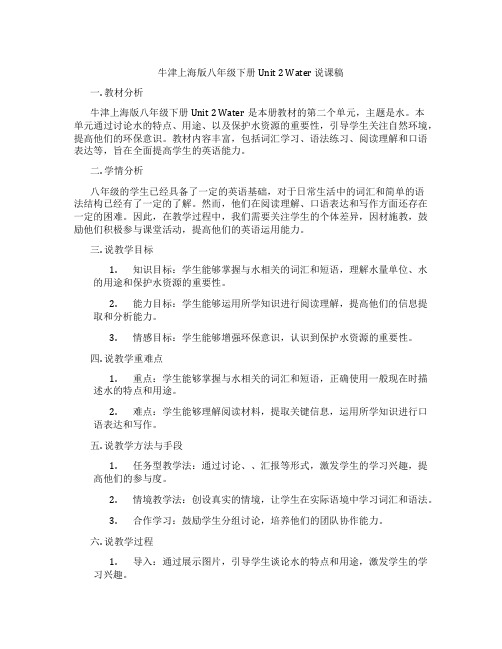
牛津上海版八年级下册 Unit 2 Water 说课稿一. 教材分析牛津上海版八年级下册Unit 2 Water是本册教材的第二个单元,主题是水。
本单元通过讨论水的特点、用途、以及保护水资源的重要性,引导学生关注自然环境,提高他们的环保意识。
教材内容丰富,包括词汇学习、语法练习、阅读理解和口语表达等,旨在全面提高学生的英语能力。
二. 学情分析八年级的学生已经具备了一定的英语基础,对于日常生活中的词汇和简单的语法结构已经有了一定的了解。
然而,他们在阅读理解、口语表达和写作方面还存在一定的困难。
因此,在教学过程中,我们需要关注学生的个体差异,因材施教,鼓励他们积极参与课堂活动,提高他们的英语运用能力。
三. 说教学目标1.知识目标:学生能够掌握与水相关的词汇和短语,理解水量单位、水的用途和保护水资源的重要性。
2.能力目标:学生能够运用所学知识进行阅读理解,提高他们的信息提取和分析能力。
3.情感目标:学生能够增强环保意识,认识到保护水资源的重要性。
四. 说教学重难点1.重点:学生能够掌握与水相关的词汇和短语,正确使用一般现在时描述水的特点和用途。
2.难点:学生能够理解阅读材料,提取关键信息,运用所学知识进行口语表达和写作。
五. 说教学方法与手段1.任务型教学法:通过讨论、、汇报等形式,激发学生的学习兴趣,提高他们的参与度。
2.情境教学法:创设真实的情境,让学生在实际语境中学习词汇和语法。
3.合作学习:鼓励学生分组讨论,培养他们的团队协作能力。
六. 说教学过程1.导入:通过展示图片,引导学生谈论水的特点和用途,激发学生的学习兴趣。
2.新课呈现:介绍一般现在时,让学生通过观察图片和阅读材料,掌握一般现在时的用法。
3.课堂活动:学生进行小组讨论,讨论水的用途和保护水资源的重要性,培养他们的口语表达能力。
4.阅读理解:学生阅读文章,提取关键信息,回答问题,提高他们的阅读理解能力。
5.语法练习:学生完成练习题,巩固一般现在时的用法。
牛津上海版八年级下册 Unit 2 Water 教学设计

牛津上海版八年级下册 Unit 2 Water 教学设计一. 教材分析牛津上海版八年级下册Unit 2 Water是关于水资源的一单元。
本单元主要围绕水资源的利用、保护和节约展开,通过学习让学生了解水资源的重要性,提高他们的环保意识。
教材包括阅读理解、词汇、语法、听力和口语练习等多个方面,内容丰富,贴近生活,有利于激发学生的学习兴趣。
二. 学情分析八年级的学生已具备一定的英语基础,对于日常生活中的话题有较强的兴趣。
但部分学生可能在阅读理解、词汇和语法方面存在困难。
因此,在教学过程中,需要关注学生的个体差异,因材施教,提高他们的英语综合运用能力。
三. 教学目标1.知识目标:学生能掌握与水相关的词汇和表达方式,了解水资源的重要性,提高环保意识。
2.能力目标:学生能通过阅读、听力练习提高自己的语言运用能力,学会在实际生活中运用所学知识。
3.情感目标:学生能认识到水资源的重要性,自觉节约用水,保护环境。
四. 教学重难点1.重点:学生能熟练掌握与水相关的词汇和表达方式,提高阅读理解和听力能力。
2.难点:学生能运用所学知识,进行实际生活中的环保行动。
五. 教学方法1.情境教学法:通过设置生活情境,让学生在实际语境中学习单词和表达方式。
2.任务型教学法:学生分组完成任务,激发合作精神,提高口语表达能力。
3.启发式教学法:引导学生思考水资源的重要性,培养他们的环保意识。
六. 教学准备1.准备相关的水资源图片、视频等教学素材。
2.设计好各个教学环节的活动和任务。
3.准备听力材料和阅读文章。
七. 教学过程1.导入(5分钟)利用图片、视频等素材引导学生谈论水资源,激发学生的学习兴趣。
2.呈现(10分钟)介绍本节课的主要内容,展示阅读文章和听力材料。
让学生初步了解水资源的重要性。
3.操练(15分钟)学生阅读文章,回答相关问题。
针对文章中的词汇和表达方式进行讲解和练习。
4.巩固(10分钟)学生进行听力练习,回答相关问题。
Unit2WaterSports

Unit 2 Water SportsTeaching Aims:1. Go on teaching the grammar: The Present Perfect Tense.2. Get the ss to master some useful expressions.3. Get the Ss to know how to do some sports and what they should pay attention to during doing spots.4. Let the ss know that doing sports is very useful for their health.Difficulties and points:1. The use of “ already; just; ever; never.”2. The difference between “ have / has been to and have / has gone to”3. The difference between “ just and just now”4. Some useful expressions: surf; surfer; surfing; al over; no matter; give up; ever since; so far; come true; be proud of ; speak highly of.Lesson 5.Properties: Recorder, overhead projector; pictures and some real objectsLanguage focus:1. Useful expressions: : surf; surfer; surfing; arrive in/ at; super; have a try; none of us.How long have you been here in Sydney? Since last Wednesday.Have you ever been to Qing dao? No, I’ve never been the re.Has he gone to the library? Yes, he went there just now.2.The Present Perfect Tense.Teaching Procedures:Ⅰ. Showing aims:1. Master some useful expressions.2. Learn the Present Perfect Tense.3. To make some dialogues freely. Try to use the drills” Have you ever been to…? Yes, I have go. No, I haven’tⅡ. RevisionRevise The Present Perfect Tense.. Ask the Ss some questions like: Have you got any paper/ notebooks? Get the Ss to answer the questions correctly, then Ss practise “ ask and answer” in pairs, using The Present Perfect Tense, and choose several pairs to perform their dialogues.Ⅲ.PresentationShow the Ss some pictures of some sports,: playing football, skating; skiing; surfing, and ask them say out some kinds of sports, then teach the word” surfing” and ask “Which sport do you like best? Get several Ss to answer.Speech cassette. L5, Part 1. Play the tape twice for the ss listen and show them the picture to look. Then the Ss can repeat the dialogue after the tape.Books open. Ask the Ss to read the dialogue in pairs, and ask four pairs to act out it in front of the class.1. Note the difference between “ have been to and have gone to.2. Note the use of some phrases: arrive in/ at; get to; reach.Ⅳ. Practise:Ask and answer. Give some places, and ask questions like:Have you been to …?’Yes, I’ve been there only once./ twice. No, I have not been there.Then ask : Who has been to London/ Sydney/ Dalian?Give some verbs for sports( surf; water-ski; canoe; dive; swim)and ask :Has anybody surfed/ water-skied?Ask two pairs to act it out in class.Ⅴ. Workbook:1. Do Exx 2 orally. Get the Ss to do it in pairs.2. Do Exx 3 Do it orally in class.Ⅵ. Summary.Homework:1. Finish the exercises in the workbook..2. Make sentences with “ arrive at/in; get to; reach; have been to/ have gone toLesson 6Properties: Recorder, overhead projector; pictures and some real objectsLanguage focus:Useful expressions: watch sb do something; all over the world; be famous for; attract; large number of; neither…nor…; no matter; different between…and…; possible; both…and…; for example; part-time; win the first prize.Have you ever watched someone surf?Hawaii is famous for its beautiful beaches.No matter what the weather is like, you can always find surfers out riding the waves.Teaching Procedures:Ⅰ. Showing aims:1. Master some useful expressions.2. Read the passage, try to do some reading comprehension.3. To train them to improve their reading ability.Ⅱ. Revision:1.Check homework.2.Revise some sports games. Ask: What is your favourite sport? Or Which sport do you like best?Have you ever water-skied? Has anyone ever surfed?Get the Ss ask and answer in pairs.Draw a picture of some sport games. Divide the class into several groups and describe the games.Ⅲ.Present ationShow surfing on TV, and have the Ss watch it. Then ask: What sport game is it?Do you like surfing? Have the Ss discussthe question in pairs and ask on e student of each pair to give their discussion to share with the whole class. Then ask the Ss to express their feeling about surfing.Ⅳ. Read.Part 2. Speech cassette. Books closed. Play the tape for the Ss to listen and find the answers to the questions, check the answers with the whole class. Help the Ss understand the passage easily. Then play the tape again for the Ss to repeat.Read the passage individually and find the answers to following questions:1. Where did surfing start?2. Why is Waikiki one of the best beaches and for surfing in Honolulu?3. What’s the difference between serious surfers and the so-called “ beach boys?”4. Who surfs three times a day if possible?5. Is Jack Booth a serious surfer or a beach boy?6. how does he make a living in Honolulu?7. When does he go surfing every day?8. What’s his dream?Discuss the questions in pairs. Then ask and answer.Ⅴ..Practice:Talk about the “ surfing “ game, use some words to describe surfing or water-skiing.Note some useful expressions:1.watch somebody do sth; see sb do sth; Have you watched sb surf? Can you see them clean the room?2.No matter ( how, when, who, what; where)No matter what he says, I don’t go.No matter how busy he is, he won’t give up his hobby.3.be famous forHangzhou is famous for its beauty.4. neither…nor…It’s neither hot nor cold in Kunming.Neither you not he works here..5.ever since: They have learned Englishever since last year.Ⅵ. Workbook:1.Do Exx 3 orally in class. Have the Ss read the dialogue in pairs,then check in class.2.Do Exx 2 as homework.Ⅸ. Summary.Homework:Finish off the exercises in the workbook..Lesson 7.Properties: Recorder, overhead projector; pictures and some real objectsLanguage focus:Useful expressions: on Bondi Beach; great fun; fail; need practice; leave for; by the way; on business; so far; travel to…; Time flies;The Present Perfect TenseTeaching Procedures:Ⅰ. Showing aims:1.Master some useful expressions.2.Practise The Present Perfect Tense3.Practise speaking ability.Ⅱ. Revision:Check homework;Revise the passage “ surfing”. Ask some SS to retell the story. Make sure all the Ss can understand the story.Practise The Present Perfect Tense. Get the Ss to make dialogues in pairs, then have some of them act out their dialogues to share with the class. Pay attention to the use of The Present Perfect Tense.Ⅲ.PresentationSpeech cassette. Play the tape for the Ss to listen and repeat. Then in pairs, have the Ss read and act the dialogue, ask several pair to perform the dialogue for the class.Note: such great fun; Tlme flies; on business;Explain the difference between “ such” and “ so”.Ⅳ. Practice:Part 2. Go through the dialogue with the Ss. Then get the Ss to ask and answer in pairs. Remind the difference between “ have/ has gone to” and “ have/ has been to”Ⅴ.Practice 2:Each student interviews a student or a teacher by asking the following questions:1. What places have you been to in China?2. Have you ever been to..?3. How many times have you been to there?4. When did you go there?5. How did you go there?6. What interesting things did you do there?7. Do you want to go there again?Then ask the ss to write a short passage about the interview, get one or two students to read in class.Ⅵ. Practice 3:Have the Ss give the answers to the questions in the book. Then ask and answer in pairs.Ⅶ.. Workbook:1.Do Exx 1 orally with the whole class. First have the ss to do it individually, then check the answers in class.2.Do Exx 3 as homework.Summary.Ⅷ. Homework:Finish the exercises in the workbook..Lesson 8.Properties: Recorder, overhead projector; pictures and some real objectsLanguage focus:Useful expressions:A 12-year-old schoolboy; try to; channel; fail; set off ; slow down; go on swimming; a big crowd of; wait for; be proud of, speak highly to/of;Teaching Procedures:Ⅰ. Showing aims:1.Master some useful expressions.2.Revise all the contents of Unit 2.3.To train their listening and writing abilities.4.Go through Checkpoint2.Ⅱ. Revision:1.Check homework.2.Revise the useful expressions, give out some useful expressions, have the Ss make sentences with the useful expressions: have/has gone to and have/ has been to”.Make sure the Ss can ask and answer correctly.3. Revise the Present Perfect Tense, have the Ss make dialogues in pairs.4.Revise the sports words. Divide the class into 5 groups and have a competition, say out the words as quickly as possible. See which group can say the most quickly and say the most words.Ⅲ.ListenListening cassette. Go through the Ex1 in WB with the Ss. Play the tape for the ss to listen and finish Ex 1 in WB . Play the tape again, get the SS to check their answers. Then check with the whole class.Ⅳ.Word Puzzle;Ask the Ss to find the words in groups of four. Get one student to share his or her answer with the whole class and check with them. The answers are Skiing; swimming; skating; boat-racing; diving.Ⅴ. Presentation:Part 3. Speech cassette. Play the tape for the Ss twice to listen and repeat. Then Then ask the ss to read the passage by themselves. Try to find the answers to the following questions:1. Who was the youngest swimmer to cross the channel?2. Which channel did he cross first?3. When did he first cross the channel?4. Where was the channel?5. Why did he slow down?6. How many hours did it take him to cross the channel?7. Did he cross the channel alone?8. How did his parents feel when he arrived the beach?Note some useful expressions on the BB: A 12-year-old schoolboy; try to; channel; fail; set off ; slow down; go on swimming; a big crowd of; wait for; be proud of, speak highly to/of;His dream cane tru e; step into; another; not only…but also…;Have the SS retell the story.Ⅵ. Write:Get one student to act as Linda and the other students act as journalists. Make an interview, then write down a passage about the interview. The journalists can ask questions like:Do you like swimming?When did you start to swim?Do you often swim/Were you afraid while you were crossing the channel?Do your parents like you to swim?How do you like when your dream comes true?Ⅶ.A poemSpeech cassette. Get the Ss to listen to the tape and read after the tape and try to learn them by heart.Ⅷ. Checkpoint 2.Go through Checkpoint 2 with the Ss. Solve any problems that the Ss may have. Make sentences with the useful expressions, and make sure that the Ss can use them freely. Get the Ss to go over the grammar notes.Ⅸ. Workbook:1. Do Exx 3 orally in class. Do it in Ex book. The answers are: E:A:D:C:B2. Do Exx 4 with the Ss in class. Practise the dialogue in pairs3. Do Ex 5 as homework.Ⅹ. Summary.Homework:Finish off the exercises in the workbook..。
九年级英语上 Unit 2 (Lesson 5-8) Water sports教案

一. 教学内容:Unit 2 (Lesson 5-8)Water sportsI.词汇surf, surfing, surfer, wave, beach, twice, none, describe, especially, attract, so-called, possible, since, part-time, although, fit, prize, petition, Olympic, event, such, fail, practice, business, cross, channel, mainland, among, proud, prideII. 词组和习惯用语have a try 尝试all over the world 全世界be famous for 以…而著名neither… nor 既不…,也不…no matter 不管give up 放弃both…and…和…都ever since 从那时起,此后一直e true 实现set off 出发step into 进入slow down 减慢a crowd of 一批be proud of 以…而骄傲not only…but also… 不但…而且so far 到现在为止speak highly of 称赞(某人)have / take … off 休(多长时间的)假III. 日常交际用语1.How long have you been in Sydney?2.Have you ever been to Hawaii?3.Would you like to have a try?4.Don’t be afraid.5.It’s such great fun.6.He’s gone to New Zealand on business.7.How many times has she been to Japan?IV. 语法现在完成时表示过去发生或已经完成的某一动作对现在造成的影响或结果,常与already, just, yet, ever, never等连用。
Unit2WaterSports
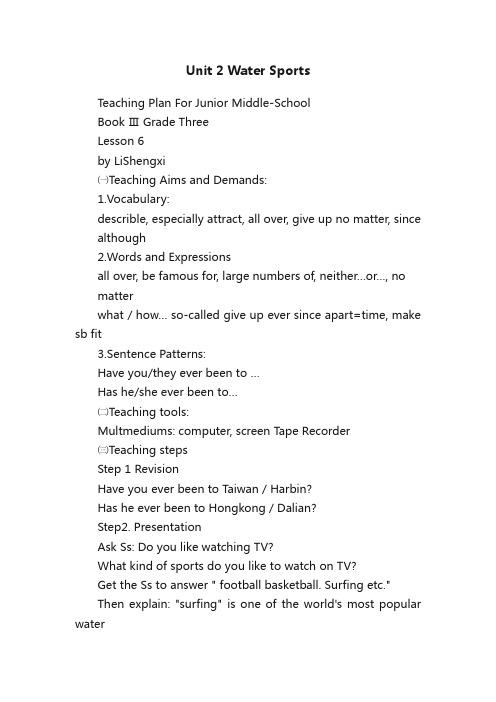
Unit 2 Water SportsTeaching Plan For Junior Middle-SchoolBook Ⅲ Grade ThreeLesson 6by LiShengxi㈠Teaching Aims and Demands:1.Vocabulary:describle, especially attract, all over, give up no matter, since although2.Words and Expressionsall over, be famous for, large numbers of, neither…or…, nomatterwhat / how… so-called give up ever since apart=time, make sb fit3.Sentence Patterns:Have you/they ever been to …Has he/she ever b een to…㈡Teaching tools:Multmediums: computer, screen Tape Recorder㈢Teaching stepsStep 1 RevisionHave you ever been to Taiwan / Harbin?Has he ever been to Hongkong / Dalian?Step2. PresentationAsk Ss: Do you like watching TV?What kind of sports do you like to watch on TV?Get the Ss to answer " football basketball. Surfing etc."Then explain: "surfing" is one of the world's most popular watersports.Step 3. Listen and answer.SB. Page 7.Part2. Speech cassette Lesson 6 listen carefully.⑴Where did s urfing first start?Step4 Read and UnderstandGet the Ss to read the text rapidly and answer the following questions.⑵Why is Waikiki one of the best beaches for surfing in Honolulu?⑶What's the difference between serious surfers and the so-called"beach boys."?⑷Who surfs three times a day if possible?⑸Is Jack Booth a serious surfer or a beach boy?⑹How does Jake Booth make a living in Honolulu?⑺When does he go surfing every day?⑻What's his dream.Step 5. Explain and understand⑴One of+ the+adj/adv(supe rlative degree)+n(pl)⑵all over=every where / in all places⑶be famous for…=be known for⑷large numbers of = a lot of⑸neither …nor…<=>both…and/either…or…⑹No matter where / when /how…etc.⑺three times a day→twice a day→once a week⑻give up = stop⑼ever since = up to the present.⑽a part-time = for only a part of the working day or week ⑾Although.⑿make sb fit.Step 6 PracticeGet the Ss to read the whole text and then do the Ex2 Work book:Step 7. Practicecomplete the passage with suitable words.Wb. Page 98 Ex3Homework:Finish off the Exx in the A B C Book lesson 6 Analyzations:Irregular Verbs 不规则动词班级姓名Infinitive Chiese Past tense Past Participlegetfreezeforgetflyfindfeelfalleatdrivedrinkdrawdodigcutcostcomechoosecatchbuy build bring break blow begin become beatare am,isbesellseesayrunrisering ride readput mistake meet mean may make lose/lu:z/ lie/lai/ lie/lai/ letleave learnlayknow keephurtholdhithithidehear have,has hang growgogivewritewinwillwear wake understand throw thinktellteach Take swim sweepspoilspitspillspendspeaksmellsleepsitsinksingshutshowshineshallsetsend初三测试题(一)姓名班级学号成绩Ⅰ、单项选择1.I have him for a long time.A.metB.seenC.knownD.found2.Can you the picture on the wall clearly?A.watchB.seeC.readD.look at3.What made you angry?A.feelB.feltC.feelingD.to feel4.There a play this evening.A.isB.hasC.is going to haveD.will be5.The factory glass every month.A.produces manyB.produces muchC.is produced manyD.is produced much6.The students decided the museum the next day.A.visitB.visitingC.visitedD.to visit7.Wei Ming English for two years.A.studiesB.is studyingC.has studiedD.studied8.He'd better a telephone call.A.to makeB.makingC.makeD.not to make9.New year soon.eesC.is cominging10.They have never been to Shanghai, ?A.do theyB.don't theyC.have theyD.haven't they11.They moon round the earth.A.travelsB.walksC.looksD.works12.China is a country.A.developB.developedC.less developedD.more developed13.John, have you finished your exercises ?A.yetB.alreadyC.stillD.also14.We have known each other 1980.A.beforeB.afterC.inD.since15.My father has been to Japan .st yearB.in two yearsC.two years agoⅡ、用所给词的适当形式填空。
新教材初三UNIT2_Water_sports.rar(3)英语课件PPT

• What kinds of water sports do you know ?
scuba diving
motorboating
windsurfing
swimming
water-skiing diving
canoeing polo
• Have you ever done any of them?
haipaijohn@ (My e-mail)
36.如果我们想要更多的玫瑰花,就必须种植更多的玫瑰树。 15.人生意义的大小,不在乎外界的变迁,而在乎内心的经验。 48.挫折其实就是迈向成功所应缴的学费。 35.请一定要有自信。你就是一道风景,没必要在别人风景里面仰视。 79.先生,如果你觉得您长得比我高而嘲笑我的话,那么我会砍下你的头,以消除这个差距——拿破仑。 93.自信是走向成功的第一步,缺乏自信是失败的主要原因。——莎士比亚 21.命运要你成长的时候,总会安排一些让你不顺心的人或事刺激你。这是规律! 49.环境永远不会十全十美,消极的人受环境控制,积极的人却控制环境。 5.你一个人心情不好,不代表全世界都需要陪你难过。 65.在漫长崎岖的人生旅途中,人们要想实现自己的理想和事业,就必须走好自己人生的每一步,就必须领悟到成功者的经验和智慧。幸福和快乐存在于自己抗争困难的过程中,决不是对困难的 妥协。放弃自己就等于放弃一切。
•A dialogue
A: B:
A: Have you ever been to Cape Town?
B:
A: Who has been there?
B:
A: Have you surfed?
B:
A: Who has surfed?
B:
/teacher/union/personal/p er_zj.php3?uid=luominjiang(个人主页) (个人BBS)
[推荐精选]Unit 2 Water sports上课学习上课学习教案
![[推荐精选]Unit 2 Water sports上课学习上课学习教案](https://img.taocdn.com/s3/m/b8563d97b0717fd5360cdcda.png)
Unit 2 Water sports教案Unit2watersports教案教学目标1.能够熟练运用所学知识来谈论"运动",特别是一些和生活密切相关的运动项目。
2.掌握本单元的有关"watersports"的单词和短语,能听、说、读部分地名,重点掌握nomater,both…and…,allover等短语或习惯用语的用法。
3.进一步学习现在完成时态,特别注意它与already,just,yet,very等词的连用,同时能够区别它们的用法。
4.能够熟练运用现在完成时态,用它来表达由过去开始,和现在相联系的动作或影响,能够区别一般过去时与现在完成时的不同。
5.运用本单元所学知识来描述某一运动。
如:theolympicGames或surfing或diving等。
素质教育目标.进一步学习现在完成时,灵活运用already,just,ever,never等词语。
2.引导学生对水上运动和其他运动进行描述,达到阐述自已喜好的目标。
3.在学习过程中,让学生了解体育运动对每个人的生活和工作的重要性。
4.通过各种教学手段,如声音、图片、动画、电视、网络等,让学生在了解有关体育知识的基础上,自觉参与各项体育运动,培养积极向上的生活情趣。
5.引导学生尝试运用不同的学习工具、学习方法、媒体素材等进行学习和提高。
教学重点和难点句型及日常交际用语.both…and…2.neither…nor…3.notonly…butalso…4.主句+though+从句5.oneof6.Nomatter+wh-词7.-HowlonghaveyoubeenhereinSydney?-Sincelastwednesday.-Ihavebeenherefortwoweeksalready.8.-Hasanybodydonesth.before?-wehave./Brucehas./Nobodyhas./…9.-Haveyoueverbeento+地点?-yes,Ihave.No,Ihaven't./Never./…0.Hehasgoneto+地点1.-wouldyouliketohaveatry?-yes,verymuch.重点例句讲解.what'sthesurfingliketoday?今天冲浪怎么样?surf作名词,意为"拍岸之浪,拍岸浪花";作动词用,意为"冲浪,作冲浪运动"。
Unit2 Water Sports 课件.ppt

Water sports
• Swimming • Surfing • Water-skiing • Canoeing • Water Polo • Wind-surfing
• Rafting • Boat Racing • Diving • Scuba Diving • Water Ballet
Waikiki
Honolulu
Waikiki is a beach on the island of Oahu, Hawaii.
Honolulu is the capital city of the island of Oahu.
and the so-called “Байду номын сангаасeach boys”? 4. Who surfs three times a day if possible? 5. Is Jake Booth a serious surfer or a beach boy? 6. How does he go surfing every day? 7. When does he go surfing every day? 8. What’s his dream?
California
San Francisco San Francisco is in the northern part of the state of California. There is a big Chinese population which has been there for over one hundred years. The China Town of San Francisco is a famous place for tourists to visit.
- 1、下载文档前请自行甄别文档内容的完整性,平台不提供额外的编辑、内容补充、找答案等附加服务。
- 2、"仅部分预览"的文档,不可在线预览部分如存在完整性等问题,可反馈申请退款(可完整预览的文档不适用该条件!)。
- 3、如文档侵犯您的权益,请联系客服反馈,我们会尽快为您处理(人工客服工作时间:9:00-18:30)。
教学目标1.能够熟练运用所学知识来谈论"运动",特别是一些和生活密切相关的运动项目。
3.进一步学习现在完成时态,特别注意它与already,just,yet,very等词的连用,同时能够区别它们的用法。
4.能够熟练运用现在完成时态,用它来表达由过去开始,和现在相联系的动作或影响,能够区别一般过去时与现在完成时的不同。
素质教育目标1. 进一步学习现在完成时,灵活运用already, just, ever, never等词语。
2. 引导学生对水上运动和其他运动进行描述,达到阐述自已喜好的目标。
3. 在学习过程中,让学生了解体育运动对每个人的生活和工作的重要性。
4. 通过各种教学手段,如声音、图片、动画、电视、网络等,让学生在了解有关体育知识的基础上,自觉参与各项体育运动,培养积极向上的生活情趣。
5. 引导学生尝试运用不同的学习工具、学习方法、媒体素材等进行学习和提高。
教学重点和难点句型及日常交际用语1. both … and …2. neither … nor …3. not only … but also …4. 主句+ though + 从句5. one of8. -has anybody done sth. before?9. -have you ever been to + 地点?-yes, i have. no, i haven't. /never. / …10. he has gone to + 地点重点例句讲解have been to. . .意思是"到过,去过",表示曾到过某地,但此时人已不在那儿了。
而have gone to…意思是"去了某地",现在人可能在去的途中或已在那个地方了,而不在说话人处。
例如:(1)have you ever been to hong kong? 你曾经去过香港吗?(2)jim has gone to england. 吉姆去英国了。
一你有表吗?一有,我有一块好表。
-have you got any pens? -yes, i have got many good ones.一你有钢笔吗?一有,我有许多好钢笔。
注意:在用one(ones)作代词时,有几点要慎重:①序数词不能用one代替,伴有基数词的名词可用one,ones代替。
例如:我们读完了第一章,现在读第二章了。
他有两支红铅笔和两支蓝铅笔。
②it(them)和one(ones)同是作代词,代替前面出现的事,但用法不同。
让用于同名称的同样事物;one用于同名称的另一样东西。
例如:-have you still the radio set? -no. i have sold it.一你有收音机吗?一没有,我把它卖了。
(这里的订是指前面的the radio set,它们是同一个无线电收音机。
)-is this fountain pen yours? -no, it is my sister's. mine is the one on the table.一这支自来水钢笔是你的吗?一不,它是我姐姐的。
我的是桌上那一支。
(这里的one不是前面的那支fountain pen,它们不是同一支自来水钢笔。
)一你要买那块表吗?一想买那块表。
一熊猫是什么样的?一我从来没见到过,所以不知道熊猫是什么样子。
(one这里泛指同类事物中的一样东西)neither… nor…既不……也不……,它们可以用来连接相同的两个句子成分或词类。
如果连接的是主语,则谓语与第二个主语保持一致。
例:(1) he isn't a student. i'm not a student.neither he nor i am a student.neither…nor的完全肯定形式是:both…and或not only…but also。
但both…and如连接主语,则谓语动词用复数,not only…but also与第二个主语保持一致。
例:he likes singing. i like singing, too.both he and i like singing. ( = not only he but also i like singing. ) 在2000年6月,一个12岁的男生李立达第一次试着横渡琼州海峡。
试比较:the boy is five years old.he s a five-year-old boy.杰克通过了这次英语测试。
那老妇人慢慢地、小心地走过街去。
(3)the ship passed through the bridge.轮船过了桥。
(从桥下穿过)那男孩爬过墙去取球。
那盲人慢慢地走过街道。
这里的speak highly of是指"高度评价","赞扬"的意思。
例如:在场的老师都称赞他的精神。
他冒着生命危险,在寒冷的水中救出这个女孩子,应该受到赞颂。
他受到了女孩子父母的赞扬。
有关speak的一些词组:speak ill of 说……坏话speak for 充当……代言人speak for oneself 为自己辩护speak sb fair 对某人彬彬有礼说话to speak of 值得一提(常用于否定句中)他不仅是我们学校的骄傲,也是海南全体人民的骄傲。
not only…but also意思是"不仅……而且",应连接相同的语法成分。
当连接主语时,谓语动词采用就近原则,即随后面的主语而定。
例如:(2)jane is not only beautiful but also kind. 珍妮不但漂亮,而且人非常好。
(连接表语)(3)he plays not only the piano but also the violin. 他不仅弹钢琴,还拉小提琴。
(连接宾诺)无论……。
no matter这个词组可以用来接两个分句,不能只用于一个分句。
另外,no matter后面用的是现在时,其含义却是将来。
无论你说什么,我都不会相信你。
(解释是没有用的)无论你什么时候来,你都会受到热烈地欢迎。
无论你怎么努力,你都不会改掉你的英文口音。
11. none,neithernone一般指三者或三者以上"都不",是代词all的反义词。
当谈到两个人或两件事的时候,不用non,而用nether,意思是"两者都不",是代词both的反义词。
none和none of 作主语时,谓语动词即可以用单数形式,也可以用复数形式。
当表示一个人或物"都不"时,一般用单数形式;当表示所有的人或物"都不"时,一般用复数形式。
当它在非正式的文体中更常用复数形式。
neither,neither of作主语时,谓语动词一般用单数形式。
但如果是neither…nor…"既不……也不;两者都不"作主语时,谓语动词根据nor后面的主语而定(也称为邻近原则)。
none of her students are/is here.她的学生中没有一个在这里。
none of those buses go to tianjin.那些公共汽车没有一辆是开到天津去的。
neither of her parents helps her. 她的父母都不帮助她。
汤姆和我都没去过纽约。
12. journey和trip的区别(1)journey适用范围很广,可指陆路、海程或飞程。
但在距离较短时一般不用这个词。
it's over 40-hour journey by train from beijing to yunnan.从北京到云南乘火车需要四十多小时的路程。
have a good journey! 祝你旅途愉快!(2)trip严格说来指"短途旅行",目的可以是公事或娱乐。
但在日常用语中也可与 journey 互换。
我们正计划去长城游览一次。
现在完成时既然本单元的重点和难点是动词的现在完成时态,而这个时态又是英语动词时态中较难掌握的一种.1.现在完成时态的含义是表示过去发生的或已完成的动作对现在造成的影响或结果。
特点是既涉及过去,又联系现在:动作是过去发生的,结果是现在存在的。
举两个例子说明:这句话说明两点:1)她是过去某一时候来的; 2)她现在还在这里。
而主要说明她还在这里了。
动词用现在完成时态,表示“现在还存在的过去某一动作的结果或影响”。
至于她过去是什么时候来的,是十分钟以前还是一小时以前,并不是这句话所要说明的情况。
she has gone. (她走了。
)从这句话中动词所用的现在完成时态可以看出“走”的动作是过去发生的,而对现在所造成的结果是她不在这里了。
动词现在完成时态所表示的“现在的影响或结果”可以包含各种情况:看得见的或看不见的,肯定的或否定的;这句话所表示的结果是看得见的,黑板现在是干净的。
这句话所说明的结果是看不见的:他现在懂法语。
上述两句如加上not,never或别的否定词,所说的结果就是否定的:结果是:房间不干净。
结果是,他不懂英语。
不管是哪一种影响或结果,只有在目前还存在的情况下才可用现在完成时态。
一旦结果或影响不复存在,就不能用现在完成时,而应用一般过去时。
这就是现在完成时和一般过去时的区别所在。
试看下面的例句:上面的例子表明:一般过去时说的是过去发生的或已经结束了的动作,它和现在没有直接关系;即使事实上和现在有关系,说话时也不强调这种关系,而只是指出那个动作发生在过去某一时间。
而现在完成时,却正要强调过去的动作和现在的关系。
2.英语动词的现在完成时态是由助动词have(has)+ 动词的过去分词构成的。
规则动词的过去分词和它的过去式相同,即在原形后加-(-d)。
可参考教参上的不规则动词的过分分词分类,以便记忆.注1:情态动词只有原形过去式,没有过去分词。
注2:个别动词有两个过去式和两个过去分词,一个为规则变化,另一个为不规则变化:写作训练1. 根据第八课的短文,组织学生用英语仿写一篇关于li lida游过海峡的新闻报道,全文不少于10句话。
要求写清楚发生了什么事,事件的地点、时间、人物,以及相关人士的评论等。
3. 书面表达假设你刚从海南岛度假回来,享受了阳光,沙滩,冲浪,美食……根据本单元所学的内容,用英语写一篇大约50字左右的短文。
典型例题3. 根据句意选择合适的词语填空。
1). the important thing is to be good at ______.6). ______ tom ______ i are happy to be your students.______ tom ______ i am good at painting. (both…and…, neither…nor…) 答案1).learning 此句意思是:重要的事情是要学会学习。
